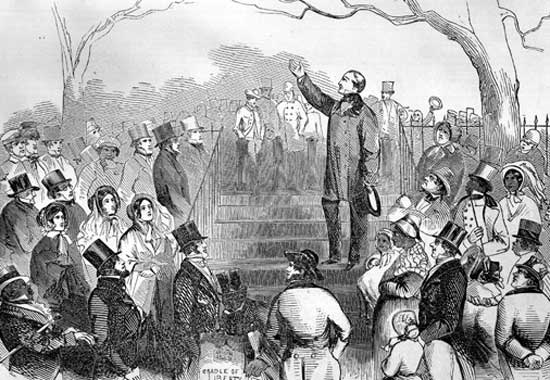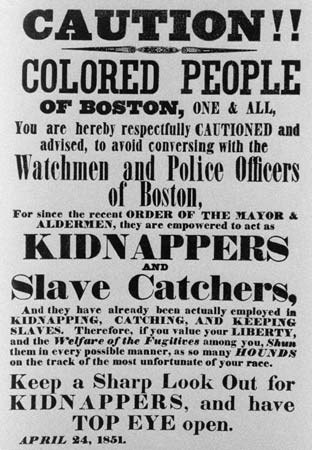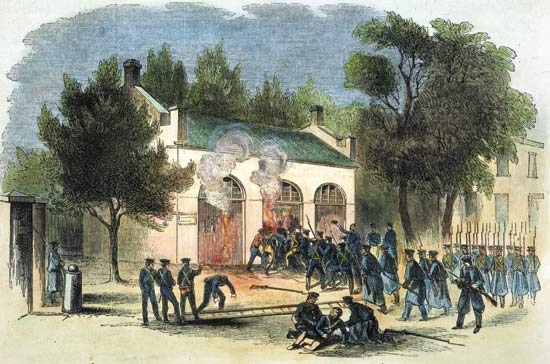abolitionism
European and American social movement
also called abolition movement
(c. 1783–1888), in western Europe and the Americas, the movement chiefly responsible for creating the emotional climate necessary for ending the transatlantic slave trade (slavery) and chattel slavery. With the decline of Roman slavery in the 5th century, the institution waned in western Europe and by the 11th century had virtually disappeared. Portuguese exploration of the west coast of Africa beginning in 1420, however, created an interest in slavery in the recently formed colonies of North America, South America, and the West Indies, where the need for plantation labour generated an immense market for slaves. Between the 16th and 19th centuries, an estimated total of 12 million Africans (Africa) were forcibly transported to the Americas.
 Despite its brutality and inhumanity, the slave system aroused little protest until the 18th century, when rationalist thinkers of the Enlightenment began to criticize it for its violation of the rights of man, and Quaker and other evangelical religious groups condemned it for its un-Christian (Christianity) qualities. By the late 18th century, moral disapproval of slavery was widespread, and antislavery reformers won a number of deceptively easy victories during this period. In Britain, Granville Sharp (Sharp, Granville) secured a legal decision in 1772 that West Indian planters could not hold slaves in Britain, since slavery was contrary to English law. In the United States, all of the states north of Maryland abolished slavery between 1777 and 1804. But antislavery sentiments had little effect on the centres of slavery themselves: the great plantations of the Deep South, the West Indies, and South America. Turning their attention to these areas, British and American abolitionists began working in the late 18th century to prohibit the importation of African slaves into the British colonies and the United States. Under the leadership of William Wilberforce (Wilberforce, William) and Thomas Clarkson (Clarkson, Thomas), these forces succeeded in getting the slave trade to the British colonies abolished in 1807. The United States prohibited the importation of slaves that same year, though widespread smuggling continued until about 1862.
Despite its brutality and inhumanity, the slave system aroused little protest until the 18th century, when rationalist thinkers of the Enlightenment began to criticize it for its violation of the rights of man, and Quaker and other evangelical religious groups condemned it for its un-Christian (Christianity) qualities. By the late 18th century, moral disapproval of slavery was widespread, and antislavery reformers won a number of deceptively easy victories during this period. In Britain, Granville Sharp (Sharp, Granville) secured a legal decision in 1772 that West Indian planters could not hold slaves in Britain, since slavery was contrary to English law. In the United States, all of the states north of Maryland abolished slavery between 1777 and 1804. But antislavery sentiments had little effect on the centres of slavery themselves: the great plantations of the Deep South, the West Indies, and South America. Turning their attention to these areas, British and American abolitionists began working in the late 18th century to prohibit the importation of African slaves into the British colonies and the United States. Under the leadership of William Wilberforce (Wilberforce, William) and Thomas Clarkson (Clarkson, Thomas), these forces succeeded in getting the slave trade to the British colonies abolished in 1807. The United States prohibited the importation of slaves that same year, though widespread smuggling continued until about 1862.Antislavery forces then concentrated on winning the emancipation of those populations already in slavery. They were triumphant when slavery was abolished in the British West Indies by 1838 and in French possessions 10 years later.
 The situation in the United States was more complex because slavery was a domestic rather than a colonial phenomenon, being the social and economic base of the plantations of 11 Southern states. Moreover, slavery had gained new vitality when an extremely profitable cotton-based agriculture developed in the South in the early 19th century. Reacting to abolitionist attacks that branded its “peculiar institution” as brutal and immoral, the South had intensified its system of slave control, particularly after the Nat Turner (Turner, Nat) revolt of 1831. By that time, American abolitionists realized the failure of gradualism and persuasion, and they subsequently turned to a more militant policy, demanding immediate abolition by law.
The situation in the United States was more complex because slavery was a domestic rather than a colonial phenomenon, being the social and economic base of the plantations of 11 Southern states. Moreover, slavery had gained new vitality when an extremely profitable cotton-based agriculture developed in the South in the early 19th century. Reacting to abolitionist attacks that branded its “peculiar institution” as brutal and immoral, the South had intensified its system of slave control, particularly after the Nat Turner (Turner, Nat) revolt of 1831. By that time, American abolitionists realized the failure of gradualism and persuasion, and they subsequently turned to a more militant policy, demanding immediate abolition by law.Probably the best-known abolitionist was the aggressive agitator William Lloyd Garrison (Garrison, William Lloyd), founder of the American Anti-Slavery Society (1833–70). Others, drawn from the ranks of the clergy, included Theodore Dwight Weld (Weld, Theodore Dwight) and Theodore Parker (Parker, Theodore); from the world of letters, John Greenleaf Whittier (Whittier, John Greenleaf), James Russell Lowell (Lowell, James Russell), and Lydia Maria Child (Child, Lydia Maria); and, from the free-black community, such articulate former slaves as Frederick Douglass (Douglass, Frederick) and William Wells Brown (Brown, William Wells).
 American abolitionism laboured under the handicap that it threatened the harmony of North and South in the Union, and it also ran counter to the U.S. Constitution, which left the question of slavery to the individual states. Consequently, the Northern public remained unwilling to adopt abolitionist policy and was distrustful of abolitionist extremism. But a number of factors combined to give the movement increased momentum. Chief among these was the question of permitting or outlawing slavery in new Western territories, with Northerners and Southerners taking increasingly adamant stands on opposite sides of that issue throughout the 1840s and '50s. There was also revulsion at the ruthlessness of slave hunters under the Fugitive Slave Law (Fugitive Slave Acts) (1850), and the far-reaching emotional response to Harriet Beecher Stowe (Stowe, Harriet Beecher)'s antislavery novel Uncle Tom's Cabin (1852) further strengthened the abolitionist cause.
American abolitionism laboured under the handicap that it threatened the harmony of North and South in the Union, and it also ran counter to the U.S. Constitution, which left the question of slavery to the individual states. Consequently, the Northern public remained unwilling to adopt abolitionist policy and was distrustful of abolitionist extremism. But a number of factors combined to give the movement increased momentum. Chief among these was the question of permitting or outlawing slavery in new Western territories, with Northerners and Southerners taking increasingly adamant stands on opposite sides of that issue throughout the 1840s and '50s. There was also revulsion at the ruthlessness of slave hunters under the Fugitive Slave Law (Fugitive Slave Acts) (1850), and the far-reaching emotional response to Harriet Beecher Stowe (Stowe, Harriet Beecher)'s antislavery novel Uncle Tom's Cabin (1852) further strengthened the abolitionist cause. Jolted by the raid (1859) of the abolitionist extremist John Brown (Brown, John) on Harpers Ferry, the South became convinced that its entire way of life, based on the cheap labour provided by slaves, was irretrievably threatened by the election to the presidency of Abraham Lincoln (Lincoln, Abraham) (November 1860), who was opposed to the spread of slavery into the Western territories. The ensuing secession of the Southern states led to the American Civil War (1861–65). The war, which began as a sectional power struggle to preserve the Union, in turn led Lincoln (who had never been an abolitionist) to emancipate the slaves in areas of the rebellion by the Emancipation Proclamation (1863) and led further to the freeing of all other slaves in the United States by the Thirteenth Amendment to the Constitution in 1865.
Jolted by the raid (1859) of the abolitionist extremist John Brown (Brown, John) on Harpers Ferry, the South became convinced that its entire way of life, based on the cheap labour provided by slaves, was irretrievably threatened by the election to the presidency of Abraham Lincoln (Lincoln, Abraham) (November 1860), who was opposed to the spread of slavery into the Western territories. The ensuing secession of the Southern states led to the American Civil War (1861–65). The war, which began as a sectional power struggle to preserve the Union, in turn led Lincoln (who had never been an abolitionist) to emancipate the slaves in areas of the rebellion by the Emancipation Proclamation (1863) and led further to the freeing of all other slaves in the United States by the Thirteenth Amendment to the Constitution in 1865.Under the pressure of worldwide public opinion, slavery was completely abolished in its last remaining Latin American strongholds, Cuba and Brazil, in 1880–86 and 1883–88, respectively, and thus the system of African slavery as a Western phenomenon ceased to exist. See also slavery.
- methyl chloride
- methylene blue
- methylene chloride
- methyl group
- metic
- Metochites, Theodore
- Metonic cycle
- metonymy
- metre
- metric space
- metric system
- Metric system
- Metrocles
- Metro-Goldwyn-Mayer, Inc.
- metrology
- metronome
- Metrophanes Kritopoulos
- metropolitan
- metropolitan area
- Metropolitan Museum of Art
- Metropolitan Opera Association
- Metro Toronto Zoo
- metrētēs
- Metsu, Gabriel
- Metta Victoria Fuller Victor